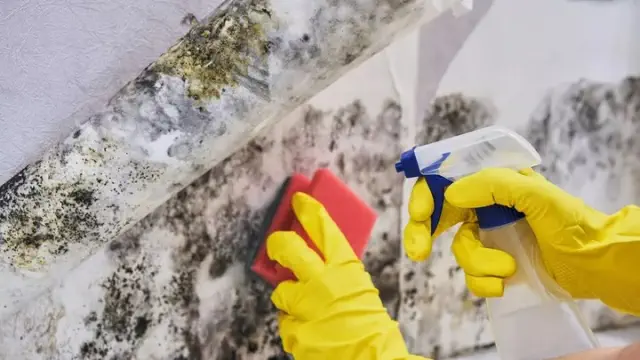All
The medical team made the decision to perform an oophorectomy on a patient without her prior knowledge.
View pictures in App save up to 80% data. A physician discussing health concerns with a patient (Shutterstock) In February 2018, Melissa Hubbard had surgery to excise a section of her colon. However, she was unaware until after the procedure that her ovaries had also been removed. Hubbard's gynecologist had advised her surgeon to remove her ovaries as a solution for another painful issue Hubbard was experiencing. Although the gynecologist had mentioned the possibility of ovary surgery to Hubbard before, she felt unprepared to proceed with it. Unbeknownst to her, the gynecologist had already recommended the surgery to the surgeon performing her colon operation. On Tuesday, the Wisconsin Supreme Court will hear oral arguments in a lawsuit that Hubbard has filed against the gynecologist, Dr. Carol Neuman. The lawsuit argues that Neuman’s recommendation to the surgeon without Hubbard’s knowledge was an act of medical negligence. The legal action that Hubbard initiated against Neuman has not yet proceeded to trial. The Ob/Gyn physician, represented by her legal team, contends that the case should be resolved through a summary judgment dismissal. The legal case — along with the physician's attempt to dismiss it — centers on Wisconsin's legislation that mandates informed consent from patients prior to receiving medical treatment. Neuman's attorneys contend that the physician bore no legal obligation regarding Hubbard's surgery according to the law, nor did she have a responsibility to inform Hubbard about what was simply Neuman's suggestion to the surgeon, as Neuman did not carry out the procedure herself. A circuit judge in Rock County opposed the arguments presented by the doctor’s legal team and denied their motion for summary judgment. The 4th District Wisconsin Court of Appeals confirmed the circuit court's decision to keep the case active. In response, Neuman’s attorneys have petitioned the state Supreme Court to overturn these rulings. In a ruling issued in March 2024 by a three-judge panel of the District 4 appeals court, Judge Chris Taylor stated that “the obligation to inform a patient regarding ‘the availability of reasonable alternative medical treatments, along with the associated benefits and risks of these options’ is applicable to all physicians treating a patient, irrespective of whether they personally administer the treatment alternatives discussed.” According to the appeals court’s summary of the case, in 2018 Hubbard was in Neuman’s care for treatment of endometriosis — a condition in which the same sort of tissue that lines the inside of the uterus also grows outside the uterus. Endometriosis can cause pain as well as infertility, according to the Mayo Clinic. In a medical record referenced in the initial lawsuit, Neuman indicated that she advised Hubbard to think about the possibility of having at least her left fallopian tube and ovary removed, or possibly both tubes and ovaries. These procedures would render Hubbard infertile; however, Neuman noted in her clinical documentation, “I suspect her endometriosis is quite advanced, and she may require assistance from reproductive specialists. She is hesitant to pursue this route as her insurance does not provide coverage for it.” According to the lawsuit, Hubbard did not consent to the removal of her reproductive organs. Neuman also directed Hubbard to a surgeon for an additional operation: the extraction of a portion of her colon, stemming from concerns regarding cancer, as stated by Hubbard’s attorney, Guy Fish from Milton. Prior to the colon surgery, the doctor suggested to the surgeon that he might consider removing Hubbard’s ovaries during the same procedure. According to Hubbard's lawsuit, "Hubbard did not inform Neuman at any point before her surgery on February 13, 2018, that she had chosen to have one or more ovaries surgically removed" during the procedure. According to the lawsuit, Neuman and Dr. Michael McGauley, the surgeon, "participated in pre-surgery discussions and planning... without involving or informing Hubbard." During their conversations, they outlined a plan where Neuman would extract Hubbard's tubes, ovaries, and uterus, while McGauley would carry out the colon surgery concurrently. According to the lawsuit, Hubbard was not made aware of those discussions. On the day of the operation, McGauley conducted the colon surgery and personally removed Hubbard's ovaries as well. The lawsuit claims, "If Hubbard had been informed of Neuman's pre-surgery advice to McGauley, he would have promptly called off the surgery set for February 13, 2018, to explore all available options." In support of the motion to dismiss the case, Neuman's attorneys contended that a physician's referral to another physician should not fall under the purview of the state's informed consent legislation. In a brief submitted to the Supreme Court, Neuman's legal representatives from the Corneille Law Group in Madison stated, “A recommendation should not be construed as an order or a directive.” The attorneys contended that failing to inform Hubbard about the recommendation Neuman provided to the surgeon should not be considered a breach of the state's informed consent regulations. The brief for Neuman states, “Doctors involved in discussing a patient's treatment should be allowed to openly share their thoughts, opinions, recommendations, and guidance without the fear of being held accountable for not informing the patient about the details of those discussions.” The brief requests that the Supreme Court remand the case to the Rock County circuit court with instructions to dismiss the lawsuit. However, Hubbard’s attorney contends that promoting transparency, including the sharing of communications between doctors, is beneficial for patients. “In a brief submitted to the high court, Fish questioned, ‘Isn't it the responsibility of a treating physician to better meet their obligations by sharing more relevant medical information with the patient?’” The lower court dismissed the claim that making the gynecologist accountable for ensuring informed consent for her advice to the surgeon would inhibit doctors from openly consulting with each other. In their decision, the judges of the appeals court concentrated on determining if the state law would be inapplicable to Neuman, even if all the factual claims presented in the lawsuit were taken as accurate. The impact of Neuman's suggestion — the removal of Hubbard's ovaries without her prior consent — was significant enough for the lower court judges to classify Neuman as a "treating physician," despite the fact that she did not carry out the surgical procedure. In their recommendation to the surgeon, they stated that Neuman arguably should have informed the patient about the potential risks associated with the procedure, the likelihood of success, and any alternative treatment options that could be considered. In summary, they concluded that Neuman did not successfully argue for the complete dismissal of the case.

How to recreate the Sabrina Carpenter Dunkin' espresso drink at home
It's that Sabrina espresso, isn't it? If you enjoy Sabrina Carpenter's music, you probably already know what her go-to coffee drink is. Sabrina’s Brown Sugar Shakin’ Espresso is a popular drink that combines rich, smooth espresso with a touch of sweetness, creating the perfect pick-me-up for any time of day. Fortunately, you can enjoy this iconic beverage right from the comfort of your own home. With only a handful of easy-to-find ingredients and a few straightforward steps, you can whip up Sabrina's Brown Sugar Shakin’ Espresso in your kitchen. Whether you're preparing for a hectic day, seeking a swift energy lift, or simply looking to indulge in a delightful drink inspired by your favorite celebrity, this guide will walk you through the process, step by step. So, gather your coffee beans and let's start brewing! What you will require This drink is made with espresso, oat milk and brown sugar sweetener all shaken over ice. The oat milk is the easy part, as you can stock up on your favorite oat milk at Amazon or Whole Foods. The brown sugar sweetener is not as simple as you might think. Sure, you could put plain brown sugar in your drink, but that won't supply the same effect as the Dunkin' drink or the similar Iced Brown Sugar Oatmilk Shaken Espresso from Starbucks. You can create your own unique flavor syrup using these ingredients: 4 tbsp lightly packed brown sugar 1/2 tsp ground cinnamon 6 tbsp water 1 tsp vanilla extract If you're in a pinch and don't have time to mix the ingredients together, many coffee creamer companies now make oat milk brown sugar creamers — our favorite is this one from Coffeemate that you can find at Target. Now it's time for the espresso. If you're ready to fully commit and purchase an espresso machine for your home, there are some excellent and budget-friendly choices available. Trusted brand De'Longhi offers an at-home espresso machine called the Stilosa that is equipped with a milk steaming wand — and it's available on Amazon for $82. It does not have a coffee grinder, but all you would need to make your at-home Sabrina drink is a pre-ground espresso-roast coffee. De'Longhi EC260BK Stilosa Espresso Maker, Black and Stainless Steel Nespresso machines are also a great option, just be sure to use a classic espresso pod and not a flavored one. For a cheaper option to make at-home espresso, a Moka pot is an excellent alternative. The Moka pot is a stovetop espresso maker, commonly used in Italian homes. It has three parts: a bottom chamber for water, a middle chamber for coffee grounds, and a top chamber for brewed coffee. The pot works by heating water in the bottom chamber, which creates steam pressure that forces the water through the coffee grounds in the middle chamber and into the top chamber. This brewing method is called percolation. Moka pots range from $11 to about $50 from Target and Amazon. It's easy to use! Fill up the bottom section with water, add ground coffee to the middle section, screw the top on, place your pot on the stove and then fire up the stove. Once you hear a bubbling sound, your pot has finished brewing, and viola, your at-home espresso has been made. Your last piece of equipment for the Sabrina drink is a cocktail shaker — yes, just like the ones you see at bars! Cocktail Shaker, 24 oz Martini Shaker, Made from Food-Grade Stainless Steel with Built-in Strainer, LUCKYGOOBO Drink Shaker, Perfect Bartender Kit Gift. Here’s a revised version: How to create it. If you're making your own syrup, start there! According to Olivia Bearmann's recipe on ItsLivB.com, make the syrup by adding all of the ingredients listed above to a saucepan on medium heat and whisk to combine. Once simmering, lower the heat and simmer the brown sugar mixture for an additional 3-5 minutes. When adding creamer to your iced latte, keep in mind that using the same quantity of creamer as you typically would milk can make your drink excessively sweet. Instead, we suggest opting for regular oat milk and just a small amount of creamer to balance the flavors. Prepare the espresso using your chosen technique. At Dunkin', a typical medium-sized shaken espresso drink usually contains two shots, but feel free to adjust the number to your taste. While the espresso is brewing, fill your cocktail shaker with half a cup of ice. After the shots are ready, carefully pour them over the ice in the shaker. Begin by adding half a cup to a full cup of oat milk to your espresso and ice mixture. If you’ve prepared your own syrup, incorporate it according to your preference. Start with a little and gradually increase until it’s as sweet as you like. When using a creamer, follow the same method—start with a small amount, taste, and if you want it sweeter, simply add more creamer. Once you've discovered the perfect balance of flavors, give it a good shake! Serve in a trendy glass for entertaining or in your favorite to-go tumbler for busy days. This beverage is sure to brighten your day. It's none other than the delightful Sabrina espresso! Set of 4 Glass Cups with Lids and Straws, 16 oz - DWTS 舞蹈比赛 Iced Coffee Tumblers for Coffee Bar Essentials. This Drinking Glasses Set includes stylish Coffee Cups with Straws and Lids, perfect for gifting! DWTS 舞蹈比赛 amazon.co.uk

Get ready for a blast from the past! Jolt Cola is making a comeback to store shelves, and this time it packs double the caffeine.
View pictures in App save up to 80% data. yonder_way72 on eBay.com Back in the day, there was a soda in stores that was almost always hidden on the bottom shelf, and your parents certainly never let you have one. That fizzy beverage is none other than Jolt Cola, a classic brown soda that has a flavor similar to many others, but with an extraordinary caffeine kick. It can be considered the original energy drink, if you think about it. According to Eatthis.com, the new Jolt Cola rebrand is in direct contrast to how Jolt was marketed in the '80s, as an alternative to Pepsi and Coke. Before the energy drink trend took off, Jolt was already on the market and often mistaken for just another soda due to its playful name. However, with its recent rebranding, Jolt aims to appeal more to energy drink enthusiasts rather than soda drinkers. The brand behind the relaunch of Jolt Cola is called Redcon1. Ryan Monahan, the chief marketing officer at Redcon1, emphasizes to both his team and the public that the company's rebranding is a strategic move, especially in light of declining soda sales and the rising popularity of energy drinks. Monahan stated, "Consumers decide the winners by how they spend their money. The truth is, we're observing a noticeable decline in soda companies." Original Jolt Cola had 73mg of caffeine in a bottle, which was a lot back in the '80s. Today's Jolt Cola will feature 200mg of caffeine. This time, your parents can't stop you from grabbing and enjoying one. The updated labeling will specify that this product is meant for individuals aged 21 and older; however, no identification will be necessary for purchase, since it does not contain any alcohol or THC. Expect to see Jolt Cola available in major retail stores, both online and in physical locations, by early 2025. Nostalgic '90s Snacks That Are No Longer Available Is there anything quite like the joy of unzipping your lunch box to find Shark Bites nestled next to a refreshing Hi-C Ecto Cooler? It's a nostalgic delight that today's kids simply can't enjoy. What other snacks have come and gone from our lives since the 1990s? Join us on a nostalgic journey as we revisit some beloved '90s treats that are no longer around. Gallery Credit: Wood Check out these 50 Must-Have Country Hits from the '90s. If you consider yourself a true enthusiast of '90s country music, it's likely that you should be familiar with the lyrics to each of these popular tracks. View pictures in App save up to 80% data. New York State Offers Financial Assistance for First-Time Homebuyers View pictures in App save up to 80% data. Another Major Retail Chain Shuts Its Doors Instantly in New York State View pictures in App save up to 80% data. Buffalo, New York Welcomes First-Time Homebuyers with Special Gifts View pictures in App save up to 80% data. Sara Evans Teams Up with Jason Aldean and Brantley Gilbert for Taste of Country Event View pictures in App save up to 80% data. It is prohibited to leave your dog outside alone in cold weather in the state of New York. View pictures in App save up to 80% data. Significant Sky Phenomenon Occurs Over Western New York on Monday View pictures in App save up to 80% data. Authorities Urging Public to Stay Away from Mulligans Demolition Site View pictures in App save up to 80% data. The Most Worrisome Aspect of the Bills' Injury Report

Children's of Alabama Expands NICU: 54 Individual Rooms for Improved Patient Care
View pictures in App save up to 80% data. Children's of Alabama is raising the bar in neonatal care with the enhancement of its NICU, which now boasts 54 private rooms. This expansion is set to provide better care for delicate newborns and infants in need of specialized medical attention. The recently updated Neonatal Intensive Care Unit (NICU) creates a safe and welcoming space for young patients, greatly improving their healthcare journey. With the introduction of private rooms, families have the opportunity to bond with their newborns, nurturing emotional ties during essential periods. This emphasis on family-oriented care not only aids in the mental health of families but also plays a vital role in the recovery of the infants. The key features of the expansion comprise specialized areas like ECMO (Extracorporeal Membrane Oxygenation) rooms, designed specifically to assist infants suffering from severe respiratory failure. This cutting-edge technology allows physicians to deliver essential oxygenation and cardiac support, significantly enhancing survival chances for critically ill newborns. With the establishment of dedicated ECMO rooms, healthcare professionals can swiftly address emergencies, equipped with the most advanced tools at their disposal. A significant advancement is the introduction of unique dialysis facilities across the state that are specifically tailored for premature infants. This essential service addresses a critical need in treatment alternatives for this at-risk group. Dialysis can be a lifesaving intervention for newborns with kidney problems, and ensuring its availability underscores the hospital's dedication to providing thorough and effective care. These improvements have led to a notable decrease in wait times for surgical procedures. Shorter waits mean faster interventions, which positively affect recovery periods and overall health results. By optimizing operational efficiency, the NICU can more effectively manage variations in patient numbers while maintaining high standards of treatment and care. Families can feel more at ease, confident that their infants will receive prompt and effective medical care. Involving families in the healthcare journey is a fundamental value at Children's of Alabama. As the NICU expands, family members are invited to take part in care activities whenever possible, allowing for the consideration of their emotional and physical needs. This collaborative approach builds trust between families and healthcare providers, establishing a nurturing atmosphere that enhances the healing process. Integrating input from families and healthcare professionals has been a fundamental aspect of this NICU expansion. Their perspectives have influenced the design and operational features of the new facility, demonstrating a true dedication to fulfilling the requirements of both patients and their families. Establishing a welcoming environment is crucial for the healing process, as it greatly enhances recovery outcomes for newborns. The benefits of this expansion for the local community are truly significant. It establishes Children’s of Alabama as a frontrunner in neonatal care within the area, drawing families from far and wide who are in search of top-notch treatment for their infants' health issues. This acknowledgment enhances the community's trust and faith in the healthcare services offered by the institution. Children's of Alabama envisions a healthcare model that goes beyond merely addressing medical conditions; it embraces a holistic strategy that emphasizes emotional, physical, and developmental support for newborns and their families. The recent expansion of the NICU embodies this commitment, ensuring comprehensive patient care that elevates the quality of neonatal medicine. Although the new NICU improves the available facilities, it is fundamentally an extension of a committed team. The healthcare professionals in the NICU contribute extensive knowledge and empathy to the everyday treatment of their patients. Their skill set, combined with cutting-edge medical technology, forms a powerful partnership aimed at addressing the most significant challenges in infant health. Recognizing that the experience in the NICU can be filled with emotional challenges for families, the hospital provides specialized support services. This encompasses counseling and bereavement assistance for those encountering the toughest situations. Children's of Alabama is committed to ensuring that every family feels supported throughout their journey, offering connections and resources to aid them. As families seek optimal care for their newborns, the innovations at Children’s of Alabama establish a new standard in neonatal healthcare. Its strong infrastructure and committed staff reinforce its status as a leading choice for neonatal treatment. Improved patient care facilities foster a supportive environment that prioritizes recovery while embracing family involvement. For families in need of medical support for their infants, the newly expanded NICU at Children’s of Alabama offers both hope and advanced care. With state-of-the-art medical facilities and a dedication to holistic treatment, parents can rest easy knowing their children are receiving exceptional care customized to meet their unique requirements in a nurturing atmosphere. Children's of Alabama is excited to open its doors to families in its newly upgraded NICU, highlighting its dedication to saving and improving the health of society's most fragile individuals. This renovation symbolizes not just progress, but also lays the groundwork for future innovations in neonatal care. Families can feel confident in their choice of a facility that emphasizes exceptional care, empathy, and state-of-the-art medical technology.

"I'm a nurse – here are some symptoms to watch out for if you suspect mould in your house."
Mould can be a stealthy invader in your living space, potentially causing problems without your awareness. However, a recent TikTok clip is shedding light on the indicators that might suggest its presence. View pictures in App save up to 80% data. Mold might be the cause of your discomfort (stock photo) A nurse from Tennessee has revealed on social media some of the signs that you may have mould exposure. Addressing her 105,999 followers, the TikTok user, known as Hopewell Family Care, identified some of the symptoms that can be triggered by mould in the home. The nurse states that "fatigue, headaches, frequent colds, and frequent ear infections," could all be "signs of mould exposure". As such, it is wise to periodically inspect those hidden corners of your home to ensure no mould is growing unseen. If you find yourself constantly under the weather, a mould issue might be to blame. The NHS Inform website cautions that: "Moulds release allergens (agents that may trigger allergic responses). Additionally, they can generate irritants and occasionally toxic compounds. Breathing in or coming into contact with mould spores can lead to allergic reactions such as: sneezing, a runny nose, red eyes, and skin rashes." Notably, they also emphasize that "Moulds have the potential to provoke asthma attacks." @hopewellfamilycare Mold sucks. Do you have any of these symptoms? #mold #moldtoxicity #moldawareness ♬ Original sound - SHIMA According to the guidance provided on gov.uk, "Dampness and mould predominantly impact the respiratory system and lungs, but they can also have effects on the eyes and skin. The respiratory issues arising from damp and mould can lead to severe health problems and, in extreme situations, may even result in death." What factors transform a house into a damp, unhealthy environment that could potentially make you unwell? Mold and dampness occur due to an overabundance of moisture, which can stem from a leak or may simply exist in the atmosphere. According to the NHS, potential culprits include:. Leaking pipes Rising damp in cellars or on the ground floor Rainwater infiltrating due to roof damage or faulty window frames Condensation The NHS recommends that homeowners identify the source of any moisture problems and "take measures to reduce humidity levels," such as utilizing a dehumidifier. Tenants are encouraged to inform their landlords about any mould concerns and explore potential remedies together. In certain situations, it might be essential to seek professional mould removal services. However, the NHS advises: "If the mould is minimal, you could potentially handle the removal on your own." They also warn: "Make sure to wear gloves and a face mask while dealing with mould. Always ensure proper ventilation by opening a window if you are using bleach-based products for cleaning."

Houston Methodist Hospital appoints new president of medical staff.
Dr. Christi Pramudji Dawe has been appointed as the president of the medical staff at Houston Methodist West Hospital. Dr. Pramudji Dawe assumed the role Jan. 1, a hospital spokesperson confirmed to Becker's. She joined Houston Methodist West Hospital in 2010 as a physician, according to her LinkedIn profile. Dr. Pramudji Dawe has nearly 20 years of experience as a urologist and is the founder of a medical spa. Houston Methodist West Hospital is in the midst of a $247 million expansion project — one result of which will be to increase its bed capacity to 307 — that is expected to be completed by 2027.

Newsletter
Get life tips delivered directly to your inbox!